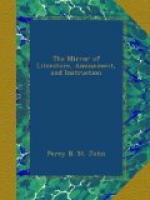The production of the work is creditable to the enthusiasm of, legally speaking, the infant author; and we should be happy to learn that our insertion in the Mirror of some of the pieces in this volume has fostered its growth. We quote an interesting passage on
Fairy Rings.
In the youthful days of an aged friend of mine, the belief in fairies existed in many parts of Wales; and, when a “schoolboy, with his satchel,” unwillingly trudging to school, he has often observed, in a meadow near Conwil, Carmarthenshire, three small circles of grass, which appeared to have been weaved round the edges. Wondering much for what purpose they were ordained, he once asked his mother the use of them, when she gave him a severe injunction not to approach on any account, much less enter the rings, for, said she, they belong to the Bendith eu mammau (a species of fairies), and whoever enters them can never get out, it being enchanted ground.
These rings have not only been noticed by the illiterate, but by philosophers and learned characters, who have advanced two opinions respecting them. Some, among whom are Dr. Priestly and Mr. Jessop, upon practical and scientific observations, attributed them to lightning, but their experiments did not prove altogether satisfactory. Drs. Wollaston, Withering, and others, who had duly examined these spots, ascribed them to the growth of fungi, which opinion seems undoubtedly the best.—The rings vary in size and shape, some having seven yards of bare, with a patch of green grass a foot broad in the middle; others, of various sizes, are encompassed with grass much greener than that in the interior. It is rather remarkable that no beasts will eat of them, although some persons suppose that sheep will greedily devour the grass. Shakspeare thus speaks in his Tempest:
“Ye elves of hills, brooks, stagnant
lakes, and groves,
And ye that on the sands with printless
foot,
Do chase the ebbing Neptune, and do fly
him
When he comes back; you demi puppets that
By moonshine do the green sour
ringlets make,
Whereof the ewe not bites, and
you whose pastime
Is to make midnight mushrooms——.”
The following story is well known in Carmarthenshire:—A farmer going out one morning very early to fetch his horses from pasture, heard some delicious music, far sweeter he thought (no doubt) than ever bard produced from his telyn (harp); and being allured by it, as we read of men being allured of old by the enchanting voices of Sirens, he proceeded to the place whence the strains seemed to issue, and in a sequestered retreat beheld the elves footing it merrily. Wishing perhaps to obtain more extensive knowledge of these “dear little creatures,” he had the magnanimity to enter the ring, with the intention of joining their matachin, and soon had his desire gratified, for there




